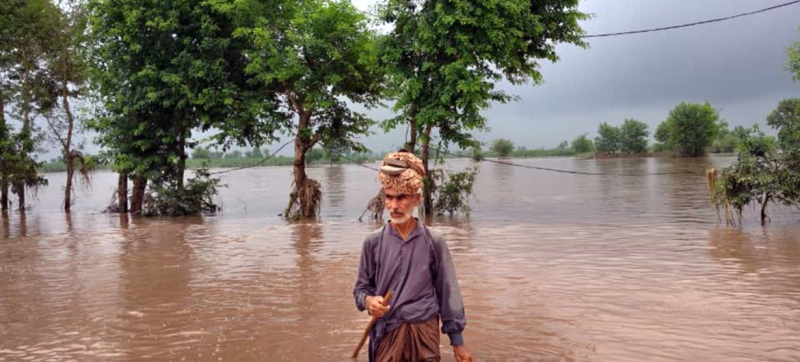- As debate over the location of climate conference razes on, will COP fail this time too? |
- UN Rights Office Warns of Gaza Escalation, West Bank Annexation |
- UN Warns Wildfires and Climate Change Worsen Air Quality |
- OIC Hails Belgian Declaration of Intent to Recognize Palestinian State |
- Bomb blast kills 15 near political rally in Pakistan |
Pakistan Floods, Climate Gaps, Lebanon Attack Raise Alarm

Secretary-General António Guterres said on Wednesday he was “profoundly saddened” by the death and destruction caused by recent floods in northern Pakistan. The death toll has surpassed 400.
In a statement, the UN chief noted that the disaster, driven by severe monsoon rains and intensified by climate change, has affected around 1.5 million people. Hundreds of thousands require humanitarian aid, while more than 3,000 homes, 400 schools and 40 health facilities have been damaged.
“The Secretary-General commends Pakistani authorities for relocating more than one million people in Punjab. He expresses solidarity with the Government and people of Pakistan, extends his condolences to families of the victims, and wishes a swift recovery to the injured,” the statement said.
The UN and partners are working with national authorities to assess the impact, identify needs and address gaps in the response. UN Emergency Relief Coordinator Tom Fletcher has released $600,000 from the Regional Humanitarian Pooled Fund for relief efforts, with discussions underway on a broader response plan.
UN Climate Change Executive Secretary Simon Stiell warned that 37 countries have failed to submit one or more mandatory reports under the Paris Agreement’s transparency framework, stressing that “no country can be left behind.”
Speaking at the Global Transparency Forum in Songdo, Republic of Korea, he said the Enhanced Transparency Framework (ETF) is not just technical reporting but “a vital tool” to strengthen climate action, attract investment and accelerate progress on clean energy.
So far, more than 100 nations have submitted their first Biennial Transparency Reports (BTRs), which Mr. Stiell called a “smart investment” that brings economic and social benefits. The first global synthesis of BTRs will be published ahead of November’s COP30 in Brazil, providing an early snapshot of progress.
The UN voiced serious concern after Israeli military drones dropped grenades near UN peacekeepers clearing roadblocks in southern Lebanon on Tuesday.
UN Spokesperson Stéphane Dujarric said the drones struck within 20 to 100 metres of UNIFIL personnel and vehicles. “Thankfully, none of our colleagues were injured,” he noted.
The incident was described by UNIFIL as one of the most serious attacks on its personnel since last November. The UN stressed that Israeli forces had been informed in advance of the road clearance work.
Secretary-General Guterres condemned the attack, insisting that “any acts which endanger peacekeepers’ lives are completely unacceptable.”
The President of the Human Rights Council, Jürg Lauber, warned that budget cuts are hampering the Council’s work ahead of its session in Geneva on Monday.
He said reduced funding is already affecting the work of Special Rapporteurs and investigative mechanisms, limiting resources for research, travel and report writing.
“It’s very clear that dwindling financial resources are impacting meetings, investigations and even the ability of witnesses to share testimony,” Mr. Lauber said. He added that cuts could also undermine the Council’s capacity to provide technical support to governments seeking to improve human rights.

